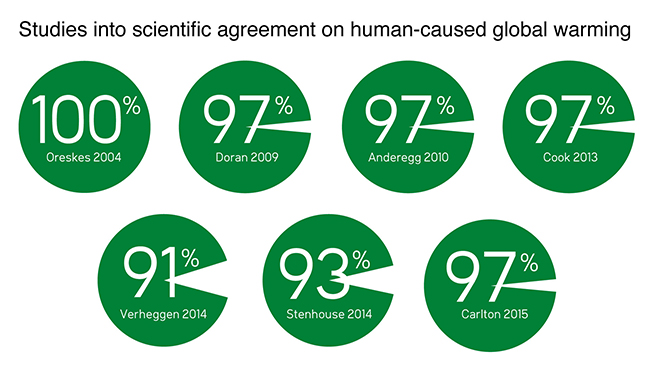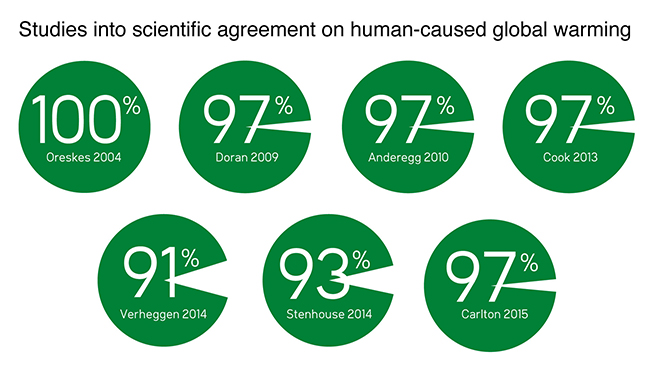It’s time for a fresh edition of “you ask the questions” here on Mountain Beltway. Anyone can ask a question, serious or spurious, and I’ll do my best to answer it here. Use the handy Google Form to to submit your questions anonymously.
Here’s this week’s question:
6. People often say that 97% of scientists agree on climate change being caused by human activities. Yet people write books and articles refuting this (maybe mostly non-scientists) but they seem to use data and are convinced of their position. Is there a legitimate argument against what these 97% of scientists say and if not, are these people just lying or making it up? Why would they do that? Is there no science to back up their claims?
 That’s a great question. It turns out that I know the ideal person to give a clear, detailed answer. The responses below come from John Cook, a research assistant professor at the Center for Climate Change Communication at George Mason University. He founded Skeptical Science, a website which won the 2011 Australian Museum Eureka Prize for the Advancement of Climate Change Knowledge and 2016 Friend of the Planet Award from the National Center for Science Education. John co-authored the college textbooks Climate Change: Examining the Facts with Weber State University professor Daniel Bedford and Climate Change Science: A Modern Synthesis and the book Climate Change Denial: Heads in the Sand. In 2013, he published a paper analyzing the scientific consensus on climate change, a matter of some relevance to the question being asked!
That’s a great question. It turns out that I know the ideal person to give a clear, detailed answer. The responses below come from John Cook, a research assistant professor at the Center for Climate Change Communication at George Mason University. He founded Skeptical Science, a website which won the 2011 Australian Museum Eureka Prize for the Advancement of Climate Change Knowledge and 2016 Friend of the Planet Award from the National Center for Science Education. John co-authored the college textbooks Climate Change: Examining the Facts with Weber State University professor Daniel Bedford and Climate Change Science: A Modern Synthesis and the book Climate Change Denial: Heads in the Sand. In 2013, he published a paper analyzing the scientific consensus on climate change, a matter of some relevance to the question being asked!
I’ve recruited John’s help to get you an authoritative, complete response. Graciously, he agreed to take it on. I attempted to break the reader’s question down into bite-sized chunks that keyed in on the main subtopics that seemed ripe for discussion.
6a) Where does the 97% number come from? Is it from one survey or multiple surveys? Is it among specialists, the general public, or some other population?
A number of studies have found 97% agreement among climate experts that humans are causing global warming. A 2009 survey by Peter Doran and Maggie Zimmerman found that among climate scientists publishing climate research, 97% agreed that humans are significantly raising global temperature. A 2010 analysis of public statements about climate change by William Anderegg found that among the scientists who had published peer-reviewed climate research, 97% agreed that humans are causing most of recent global warming. I was part of a team that published a 2013 analysis of peer-reviewed climate papers – we found that among papers stating a position on human-caused global warming, 97% endorsed the consensus.
There have been other studies measuring the consensus. This motivated us to collaborate with co-authors of seven of the leading consensus studies (the paper is Consensus on consensus: a synthesis of consensus estimates on human-caused global warming). We found two key results. First, agreement on human-caused global warming increases with expertise in climate science. The highest agreement is among climate scientists publishing climate research. Second, among the group of climate experts, there was overwhelming agreement – between 90 to 100% with a number of studies converging on 97%.
 Skeptical Science
Skeptical Science
6b) Who are the remaining 3%, then? Can you give a representative example or two?
It’s difficult to give a representative example because there is no coherent story across the contrarian papers and scientists. They often argue positions contradictory with each other (e.g., arguing “climate change isn’t happening” versus “climate change *is* happening but not caused by humans”). This incoherence inspired us to coauthor a paper about the incoherence of climate science denial. Rejection of human-caused global warming isn’t about presenting an alternative, coherent explanation of global warming – it’s about manufacturing doubt in order to decrease public support for climate action.
6c) What data are they (the contrarians) using? Is their data complete? Is their data compelling?
We’ve published several studies examining the data and analysis in contrarian papers. In one study, we show how their methods consistently show methodological flaws and common mistakes. Probably the most common mistake is cherry picking – ignoring any data or research that is inconsistent with their argument. For this reason, contrarian studies are often found to possess significant flaws in subsequent research.
6d) Are they “just lying” or “making it up” or is something else going?
It’s always problematic trying to guess what’s going on under the hood, and judge whether a person is intentionally trying to deceive versus genuinely believing misinformation. Psychological research tells us that this is especially difficult because from the outside, intentional deception looks exactly the same as cognitive biases that cause people to self-deceive. For example, misleading through cherry picking might be intentional, but it might be the product of confirmation bias – people ascribing more weight to evidence that confirms their beliefs. Similarly, appealing to fake experts might be a strategy to cast doubt on the scientific consensus, but people also ascribe more credibility and expertise to people whom they agree with.
6e) What do you interpret their motivations to be?
The biggest driver behind the rejection of climate science isn’t ignorance, stupidity or lack of education. The biggest driver of climate science denial is political affiliation, and the second biggest driver is political ideology. Political beliefs drive people’s views on the human role in climate change.
The reason for this is because supporters of free, unregulated markets dislike that one of the proposed solutions to climate change is regulation of polluting industries. Aversion to a solution leads them to deny that there’s a problem in the first place that needs solving.
It’s crucially important to understand this dynamic as it helps us distinguish between genuine skepticism and science denial. Skepticism is a good thing – a genuine skeptic considers the evidence then comes to a conclusion. A denialist, on the other hand, comes to a conclusion first then denies any evidence that conflicts with that conclusion. And science denial carries certain tell-tale characteristics.
So ideology and tribalism are the key drivers of climate science denial.
6f) Is there any hope of either the 3% or the 97% changing their minds? If so, what conditions might be required to make them re-evaluate their conclusions?
I would say those are two separate questions, given the asymmetry of the situation. For the 97% of climate scientists, the case for human-caused global warming is based on many independent lines of empirical evidence. We see human fingerprints all over our climate, painting a clear, coherent picture. Personally, to change my mind and I’m guessing this is also the case for most of the 97% of climate scientists, it would require showing that not just one line of evidence is false – but many or all of them are false. This is why the consensus on climate change is so robust – overturning a consilience of evidence is incredibly unlikely.
Regarding the 3%, the rejection of climate science is based on factors such as political affiliation or political ideology. It’s an unfortunate psychological reality that people whose views aren’t based on facts and evidence are unlikely to be persuaded by facts and evidence.
However, I would like to offer one ray of hope. Anecdotally, I know of a few people who have changed their mind about climate change and the lightbulb moment that at least began their journey was the realisation that they were being misled by misinformation. I’ve tested this principle in the lab by explaining a technique, or fallacy, of science denial. I found that across the political spectrum, when people were told about the technique that misinformation uses to mislead, they were no longer influenced by the misinformation. No-one, whether they’re conservative or liberal, like being misled. This communication approach, based on a branch of psychological research known as inoculation theory, is something I’m exploring further in my research at the Center for Climate Change Communication.
6g) Anything else you might like to add?
There has been one interesting response from opponents of climate action to the series of studies finding 97% consensus on climate change. One response has been “well, science isn’t done by consensus.” This is interesting because the retort comes from the same people who have been telling us for decades that there is no scientific consensus on climate change. Why tell us there’s no consensus if science isn’t done by consensus?
The long history of consensus denial goes back decades. In the 1990s, political strategist Frank Luntz advised Republicans to cast doubt on consensus in order to delay public support for climate action. This strategy continues to this day. If you’re wanting to delay climate action, it’s a good strategy. Psychologists have identified perceived scientific consensus as a “gateway belief”. The public use expert opinion as a heuristic, or mental shortcut, to guide their views on complicated scientific issues. If they think the experts disagree on climate change, they hold off on supporting climate action.
So it’s important that scientists communicate the high level of agreement on human-caused global warming, in order to address the misconception that scientists disagree. But they should do this with their eyes wide open – communicating the consensus may result in backlash from opponents of climate action. But this underscores the imperative of communicating the consensus – to fail to do so will allow opponents of climate action to continue to misinform the public and erode support for climate policies.
Thanks again to John for taking the time to share his expertise with my readers. If you’re interested in keeping up with his research, I recommend you follow him on Twitter. If you have other questions about science, the Earth system, or anything else, please ask them.

